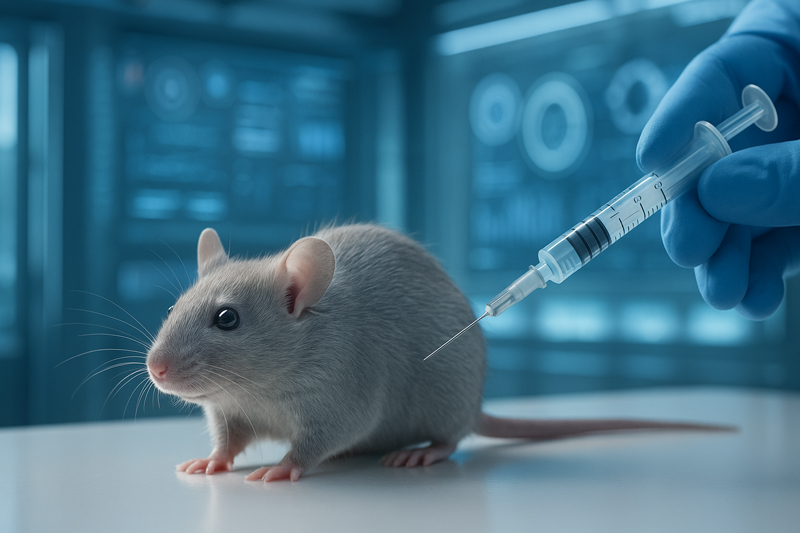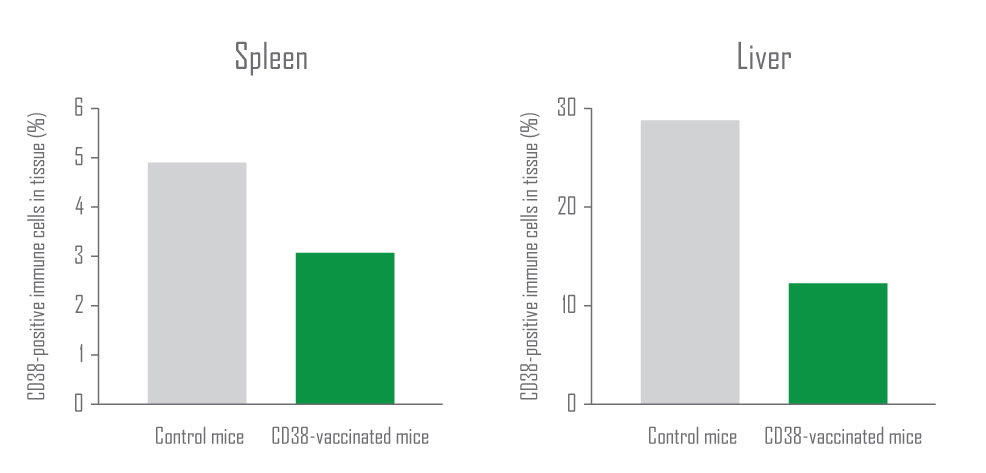
14th July 2025 CD38 vaccine rejuvenates aging mice A novel anti-aging vaccine has shown remarkable results in mice – restoring youthful metabolism, physical function, and brain performance with just two injections.
Researchers from China have developed a promising new approach to slow the effects of aging – by using a peptide-based vaccine. Peptides are short chains of amino acids that trigger specific immune responses, making them ideal for targeting harmful proteins. In this case, the researchers focused on CD38, a protein which accumulates with age and plays a major role in depleting NAD⁺, a molecule vital for energy and cellular repair. In experiments published in Aging Cell, scientists administered the vaccine to middle-aged mice and observed wide-ranging improvements in their physiology, including energy levels, glucose tolerance, memory, and even the molecular signature of their livers. While still in the early stages and limited to animal studies, these results hint at the potential for a powerful tool to treat age-related decline in humans. CD38 is a protein that accumulates in immune cells during aging and contributes to inflammation and metabolic dysfunction. It also depletes NAD⁺, a molecule vital for energy production and DNA repair. By designing a vaccine to prompt the immune system to selectively eliminate CD38-expressing cells, the researchers effectively pruned these pro-aging cells from the body. Mice received two key doses – one at 12 months and a booster at 18 months – followed by assessment at 20 months (roughly equivalent to human middle age). In the spleen and liver, the proportion of CD38-positive myeloid cells dropped by 40% and 60% respectively (see graph below). Among these CD38-positive cells, the number showing signs of senescence – cells that have stopped dividing and begun secreting harmful compounds – dropped from 20% in control mice to just 5% in the vaccinated ones, representing a reduction of three-quarters. Liver and brain tissue in the vaccinated mice showed higher NAD⁺ levels and a more favourable NAD⁺/NADH ratio, supporting improved metabolic health.
Importantly, these molecular changes translated into real-world improvements. Treated mice demonstrated better grip strength, coordination, and endurance compared to control animals. In cognitive tests, they found escape platforms more quickly and remembered their locations more accurately. Metabolic readings revealed more efficient glucose processing and increased oxygen consumption across both day and night cycles. Perhaps most striking of all, the team conducted a proteomic analysis of liver tissue – measuring 6,950 proteins – and found that nearly two-thirds (63.7%) of the age-altered proteins had shifted back toward a youthful pattern. This suggests a sweeping, systemic reversal of aging markers at the molecular level. The researchers selected the peptide ANYEFSQV for its ability to trigger a strong, targeted immune response. It activated the kind of T cells that help eliminate harmful immune cells without causing broader immune disruption. While the concept of targeting CD38 isn't new – drug companies have trialled antibodies and small molecules to inhibit it – these typically require ongoing treatment. A vaccine approach, by contrast, could offer long-lasting benefits from just a few doses, with fewer issues around cost or daily adherence. However, much work remains before this can be applied in humans. The specific peptide used in this study was designed for mice, and a different sequence would be needed for human immune systems. Long-term safety also needs further evaluation. Still, this new research offers a compelling proof of concept. By removing a major barrier to NAD⁺ function, the vaccine helped rewire multiple aging systems – from muscles and metabolism to memory and the molecular hallmarks of aging. If similar outcomes can be achieved in human patients, this could represent a major step forward in preventative medicine and healthy aging. These findings add to a growing body of evidence suggesting that targeted immune interventions could one day delay or even partially reverse aspects of biological aging. While caution is warranted, the idea of a "longevity booster" is inching closer to reality.
Comments »
If you enjoyed this article, please consider sharing it:
|
||||||








